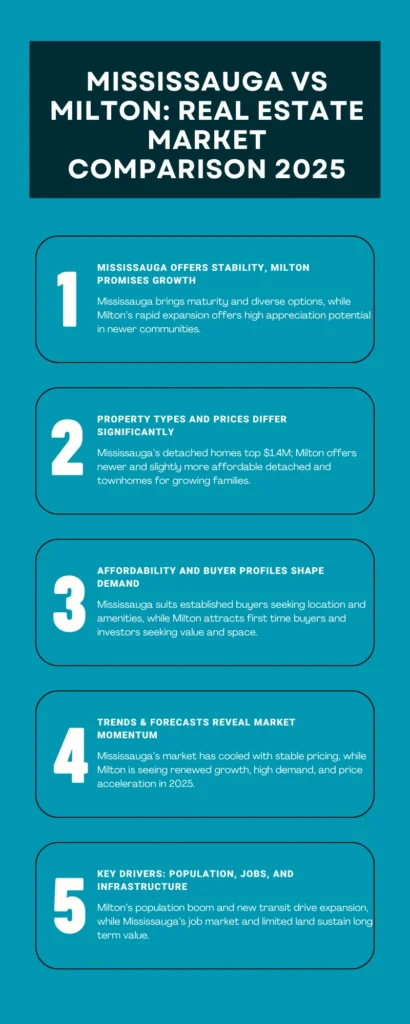Mississauga vs Milton Real Estate Market Comparison


Table of Contents
ToggleHomebuyers and investors in the Greater Toronto Area often face a big question: should they choose Mississauga or Milton for their next property purchase? Both cities have strong markets, but their dynamics are very different. This Real Estate Market Comparison explores the latest trends, pricing, and factors that shape these two markets in 2025. By understanding these differences, you can make a smarter decision whether you’re buying a home or planning an investment.
When we talk about real estate market comparison in Mississauga and Milton, we’re looking at two markets that are geographically close but distinct in behavior. Mississauga is a large, urbanized city with an established housing market. Milton is a rapidly growing town with a younger housing stock and an influx of new residents.
In 2025, the average home price in Mississauga sits just over one million dollars, while Milton is slightly higher at around $1.03 million. The key difference lies in supply and demand. Mississauga has more listings and a broad mix of properties, while Milton has fewer listings but faster growth.
For buyers, this means Mississauga offers more choices, whereas Milton provides more competition in a market where prices are rising steadily.
Looking deeper, property type plays a huge role in shaping affordability and demand of real estate market comparison in both cities.
This section of our Real Estate Market Comparison shows that buyers should consider the property type as much as the city choice.
Affordability continues to be a challenge across the GTA, but differences emerge when comparing these two cities.
Mississauga’s land scarcity keeps detached prices high, pushing many buyers toward condos and townhouses. While these properties are more affordable, the cost of living and property taxes remain factors to consider.
Milton, despite having slightly higher average condo prices, offers better affordability in new developments. Townhomes and entry level detached homes here attract young families who want more space for their money.
For investors, real estate market comparison ,rental demand is strong in both cities. Milton’s expanding population drives high rental yields, while Mississauga’s steady job market keeps rental occupancy rates healthy.
Neighborhoods are the heartbeat of any housing market. In this Real Estate Market Comparison, it’s clear that location within each city heavily influences prices.
In Mississauga real estate market comparison, upscale neighborhoods like Lorne Park, Mineola, and Port Credit remain at the top in terms of pricing. These areas offer proximity to the lake, excellent schools, and a lifestyle many families desire. On the other hand, neighborhoods like Cooksville or older parts of Meadowvale provide more affordable housing without compromising on access to amenities.
Milton’s neighborhoods are newer, with master planned communities that appeal to families. Areas close to highways and Train stations see the most demand. Emerging neighborhoods offer more value for buyers willing to invest early before prices climb further.
Trends in 2025 tell two different stories. In real estate market comparison, Mississauga’s prices have stabilized after years of rapid increases. Homes stay on the market a bit longer, giving buyers more negotiating power. Sellers, however, must price homes realistically to attract offers.
Milton’s market has rebounded strongly after a brief cooling period earlier in the year. Demand is high, prices are rising, and new construction continues to attract buyers. This growth is fueled by population increases and improved infrastructure, which make Milton even more attractive to commuters.
Looking forward, experts predict modest price growth in Mississauga and stronger gains in Milton. This forecast makes Milton appealing to investors who are focused on appreciation potential.
Investors approach these markets with different strategies. In Mississauga, established neighborhoods with good schools and transit access offer steady appreciation. Condos in the city center attract renters, while detached homes maintain strong resale value.
Milton offers higher growth potential in the short term. Investors purchasing early in new developments benefit from price increases as communities mature. Rental demand is strong here as new residents search for temporary housing while waiting to buy.
From an investment perspective, Mississauga offers stability, while Milton provides an opportunity for higher returns if timed correctly.
Several factors explain why this Real Estate Market Comparison shows such differences between Mississauga and Milton:
These elements combine to create two markets with unique strengths.
Experts agree there is no one size fits all answer. Buyers seeking established neighborhoods, variety, and long term stability lean toward Mississauga. Investors and first-time buyers who prioritize growth potential often choose Milton.
The conclusion is clear: both markets are strong, but success depends on aligning your goals with the strengths of each city.
This Real Estate Market Comparison reveals that Mississauga offers diversity, maturity, and steady growth, while Milton delivers affordability in some segments and strong appreciation potential. Both cities present great opportunities, but they cater to different buyer profiles.
For families, Mississauga offers established communities and access to services. For investors and younger buyers, Milton’s growth trajectory may deliver better returns. Understanding these nuances ensures you choose the market that best matches your needs.